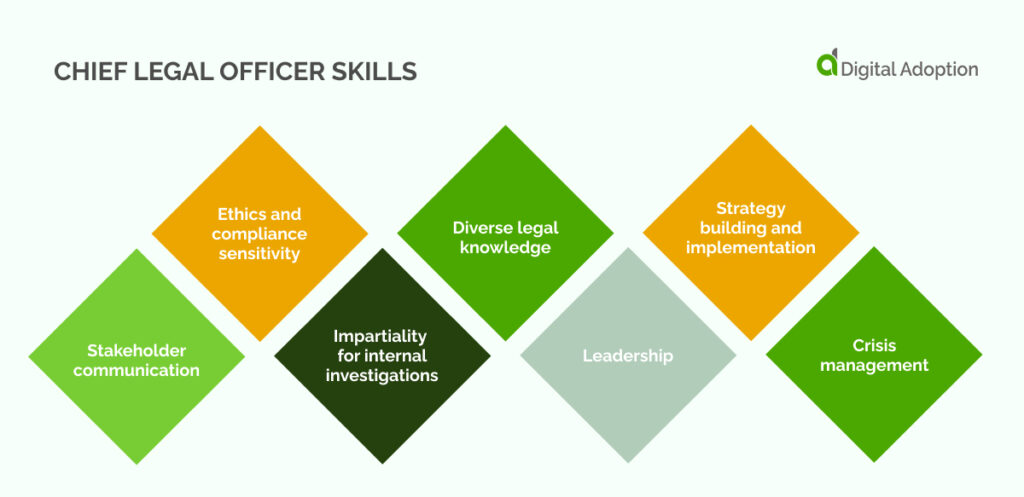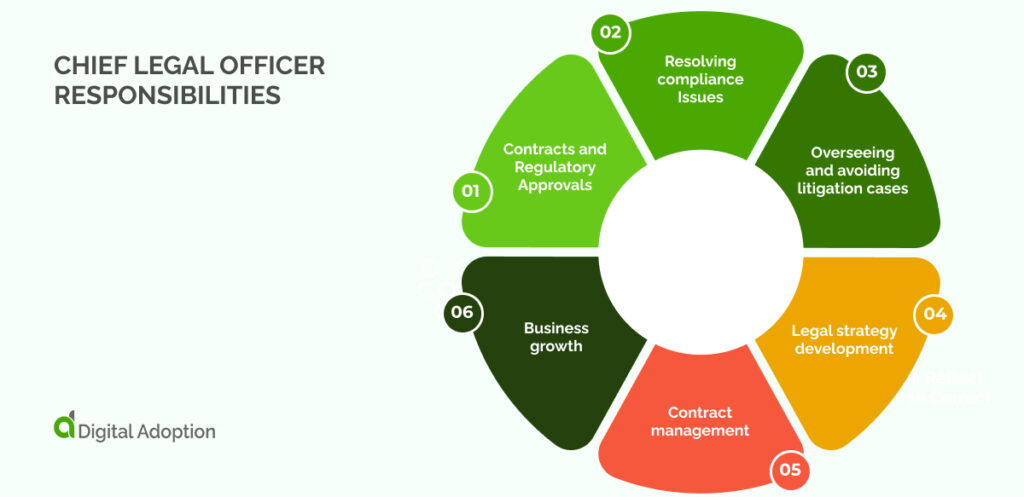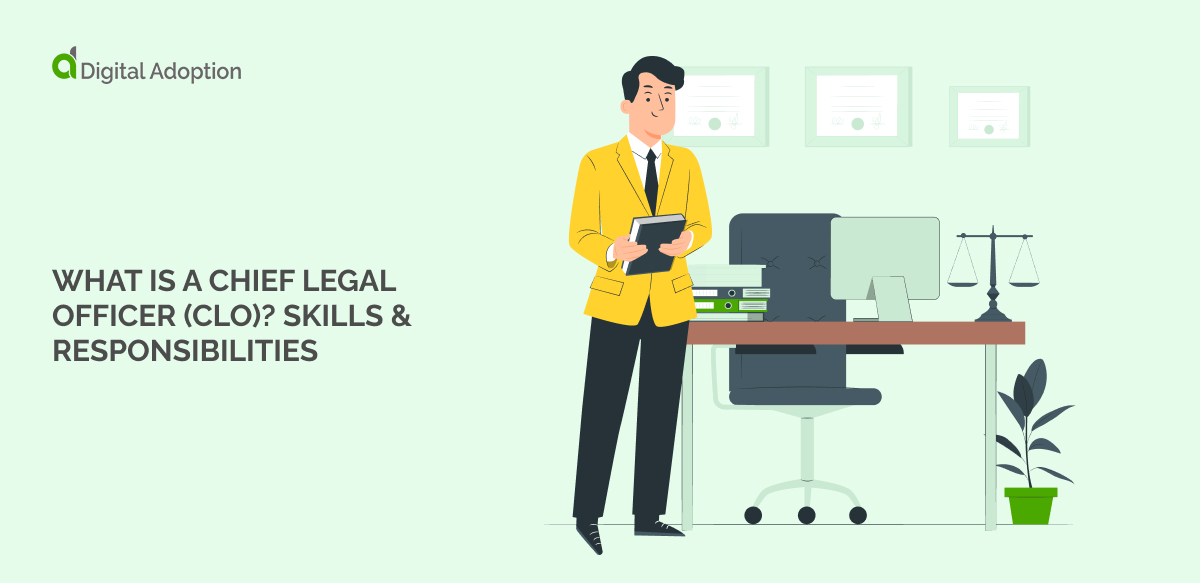We live in a fragile time regarding legal matters for enterprises.
The costly litigation risks, confidential data security, and company reputation resulting from high-profile legal cases should lead you to one conclusion: Every enterprise needs a chief legal officer (CLO) to forge an airtight digital business strategy within GRC guidelines.
The chief legal officer is responsible for avoiding legal problems by maintaining regulatory compliance and creating a culture of awareness of legal risks. The benefits are excellent brand reputation and lower customer retention cost as loyalty increases.
One of the highest risks, with 19% of respondents reporting it as a concern, is changes in regulation and legislation, which CLOs are directly responsible for. So, by hiring a competent CLO, you eliminate a large amount of risk, damages to the company’s reputation, employee departures, and financial waste.
This article will explain what a chief legal officer is, how to understand the role, skills, and responsibilities, and how to work with one.
When you’ve finished reading, you will know everything about the CLO and the value of hiring one to protect your organization from legal harm, reduce waste, and make your employees proud to work for your company.
What is a chief legal officer?
The chief legal officer (CLO) is a C-suite executive responsible for all legal matters of an enterprise.
The CLO protects their enterprise from legal harm, such as litigation, by developing legal strategies and ensuring compliance with changing regulations and legislation using compliance programs.
The CLO is essential for any organization because it prevents or reduces financial waste by avoiding litigation defense fees and reducing damages to reputation and employee departures due to a lack of confidence resulting from reputation damage.
Understanding the chief legal officer role
The chief legal officer role has many aspects. They liaise with many C-suites, such as the CMO, CIO, and CTO, to ensure legal compliance in all processes and operations. They also hold extensive legal experience and serve on the operating committee.
A chief legal officer is a legal executive appointed to govern a firm’s legal department, lead in-house attorneys, provide direction on significant legal and regulatory issues, and work to minimize legal risks.
A CLO’s professional history typically includes roles such as head of legal, general counsel, and general partner.
They may also be members of the company’s operating committee that the CEO oversees. They often keep the company abreast of legal changes that affect the firm or its industry.
Other duties include establishing a curriculum to educate employees on legal matters, overseeing hiring practices, and litigating on behalf of the company.
Chief legal officer skills

Your legal officer is essential for various vital reasons. Their communication, ethics, compliance, and leadership expertise drive organizational success. They also reduce risks that can cause long-term reputation and financial challenges and build sustainable trust between your organization and stakeholders.
Stakeholder communication
The CLO is critical in stakeholder communication because it communicates legal strategies and policies to internal and external parties. They ensure that stakeholders, including executives, employees, and board members, understand the legal implications of business decisions.
Effective communication promotes transparency and trust, allowing the organization to navigate complex legal landscapes successfully.
This skill is vital for aligning business objectives with legal requirements, ultimately supporting enterprise success and mitigating potential risks.
Ethics and compliance sensitivity
CLOs demonstrate ethics and compliance sensitivity by developing and enforcing robust compliance programs that promote ethical behavior within the organization.
They assess risks and ensure that all business practices adhere to legal and ethical standards, providing training and resources to employees. They often use guidance from official government agencies like the Cybersecurity & Infrastructure Security Agency (CISA) to direct policy on ethics and compliance.
By promoting a culture of compliance, CLOs help prevent legal violations and reputational damage. This sensitivity is crucial for enterprise success, as it builds stakeholder trust and protects the organization from costly legal repercussions.
Impartiality for internal investigations
The CLO ensures impartiality during internal investigations by conducting thorough and unbiased assessments of potential misconduct. They establish protocols that uphold fairness and confidentiality while focusing on accountability.
By acting impartially, CLOs build credibility with stakeholders and demonstrate a commitment to integrity.
Impartiality is essential for enterprise success, as it helps resolve issues effectively, promotes a positive workplace culture, and mitigates the risk of legal challenges stemming from biased investigations.
Diverse legal knowledge
CLOs leverage their diverse legal knowledge to navigate complex regulatory environments, covering intellectual property, labor law, and corporate governance.
This breadth of expertise enables them to provide comprehensive legal advice and develop strategies that align with business goals.
Their diverse legal knowledge is crucial for enterprise success, as it allows the organization to capitalize on opportunities while effectively managing risks and ensuring compliance across various jurisdictions and sectors.
Leadership
As leaders, CLOs inspire and guide their legal teams while collaborating with other executives to drive business strategies. They set a vision for the legal function, promote talent development, and encourage a proactive approach to legal challenges.
Effective leadership is vital for enterprise success. It promotes a culture of accountability, agility, and collaboration, empowering the organization to respond swiftly to legal issues and seize opportunities in a dynamic business environment.
Strategy building and implementation
As a strategist, the CLO offers a clear legal strategy that supports business goals. They provide the senior executive team with legal guidance to achieve growth objectives and build solid relationships with leadership and board members.
Understanding the business’s strategy and value levers, they integrate these into the legal approach. As a trusted advisor, they proactively engage management and the board on strategic issues, anticipating and developing strategies for regulatory changes and public policy.
Crisis management
CLOs often lead during corporate crises, offering legal advice and guidance to manage situations threatening the company’s reputation, financial stability, or legal standing. Their expertise is essential in navigating legal and reputational risks during such times.
They also coordinate with external counsel, public relations teams, and regulatory bodies to ensure a unified response.
They manage communication strategies to mitigate negative publicity and legal repercussions while addressing the root causes of the crisis, helping the company maintain integrity and stakeholder trust.
Consider the above list of skills. Do they overlap with your current CLO? If not, you may need to offer your chief legal officer support in terms of extended access to external counsel or public relations teams or offer to improve their skills with training.
Chief legal officer responsibilities

CLO responsibilities are essential to keep their organization safe from legal risks. They include contracts, resolving compliance issues, and overseeing and resolving litigation cases.
Contracts and Regulatory Approvals
Contract lifecycle management (CLM) is gaining increased attention and urgency. While control and compliance are vital, contracts are growing more complex due to changing terms related to data, security, privacy, and access.
Contracts are crucial management information sources in the current business landscape, enabling deal adaptability and agility. They offer legal opportunities to enhance business by providing protections, reducing friction, speeding up market entry, and driving revenue growth.
To maximize CLM value, the most effective CLOs adopt a holistic approach, implement new technology, and build stakeholder consensus.
Resolving compliance Issues
CLOs are responsible for identifying, addressing, and resolving compliance issues that arise within the organization.
They carry out this responsibility through the following activities:
- Conducting regular audits.
- Assessing regulatory changes.
- Guiding compliance.
CLOs ensure that the organization adheres to legal and ethical standards by developing a culture of compliance through training and clear communication.
This responsibility is crucial for the enterprise, as it mitigates risks, avoids penalties, and protects the company’s reputation.
Overseeing and avoiding litigation cases
In guardian overseer mode, the CLO guides legal and regulatory matters for the business, navigating complexity while mitigating risk.
This foundational responsibility of the chief legal officer role and the in-house legal team includes guarding corporate integrity and embodying the tone at the top within the legal department.
It also involves understanding business and compliance risk, maintaining clarity between the board’s and management’s roles, identifying and remediating brand and reputation risk exposure, and managing the governance approach on regulatory and legal issues.
Legal strategy development
CLOs are responsible for developing a comprehensive legal strategy that aligns with the organization’s business objectives. They assess the legal landscape, identify potential risks, and formulate proactive mitigation approaches.
CLOs engage with stakeholders, including executives and departments, to ensure the legal strategy supports overall business goals.
This responsibility is crucial as it helps the enterprise navigate legal challenges, optimize compliance, and capitalize on opportunities for growth and innovation.
Contract management
CLOs oversee contract management by developing policies and processes for creating, negotiating, and monitoring contracts. They ensure that contracts align with legal standards and business objectives while managing risks associated with contractual obligations.
By collaborating with various departments, CLOs streamline contract workflows and enhance efficiency.
This action is vital for the enterprise, as effective contract management reduces legal exposure, supports compliance, and drives successful business relationships, ultimately contributing to the organization’s financial performance.
Business growth
The CLO enables competitive advantage by providing a legal perspective and critical guidance that helps the executive leadership team select the right path and set a strong tone at the top for the business.
This approach includes assessing whether the business carries out compliance processes correctly, developing the corporate risk profile, and establishing a robust company-wide compliance framework.
They empower the legal team as trusted advisors, build a culture of compliance and integrity, challenge the status quo, and enhance client satisfaction by adding legal value.
Use the above list to create a checklist of responsibilities. Consider how your current CLO performs according to this list. If they underperform in some areas, offer them legal team support and discuss what other support they may require to optimize their role, ensure compliance, and reduce waste.
Working with a chief legal officer
Due to their specialized skill set, working alongside legal officers can be challenging. Follow the guidance below to help you optimize your investment in a CLO, especially if you hire an external person for support on a contract basis.
Understand the business context
To enable the CLO to offer you valuable legal advice, it’s essential to allow them to familiarize themselves with the company’s strategic goals and the industry in which it operates. This understanding will enable them to align their legal recommendations with your company’s objectives and the CLO’s strategic vision.
Communicate clearly and simply
CLOs often manage numerous responsibilities and decision-making processes. Clear and concise communication that gets to the point is highly appreciated. Provide actionable insights and recommendations that support informed decision-making.
Be proactive about risk
Anticipate potential legal issues and alert the CLO with proposed mitigation strategies. Proactive risk management is a crucial area where outside counsel can significantly contribute value.
Promote a collaborative approach
Work closely with the CLO and their team to ensure the internal legal strategy supports the broader organizational goals. While presenting differing legal opinions is acceptable when necessary, outside counsel’s actions should generally align with the internal team’s efforts.
Help the CLO to adapt to the company’s culture
Every company has a unique culture and way of operating. Helping the CLO understand and adapt to this culture can strengthen your working relationship with them and help them form lasting relationships with the wider executive team.
Engaging with a CLO goes beyond legal expertise; it requires a strategic partnership centered on insight and alignment with business objectives, promoting solid relationships that can enhance a firm’s bottom line.
Chief legal officers must be aware of future trends
One of the strengths of the best chief legal officers is using their extensive experience of past legal frameworks that feed into how companies regulate themselves today.
However, the person responsible for an enterprise’s legal security must also be aware of trends that will inform regulatory changes to prepare for them before competitors as part of a proactive legal strategy.
42% of legal and compliance leaders reported that their highest priority in 2024 was to expand legal and compliance impact on their enterprise. They can achieve this by training and embedding legal values in company culture, especially with AI compliance.
When CLOs look to the future to beat competitors, they use a fresh perspective that elevates regulation and compliance to a higher level. They protect their organization from litigation and build a reputation of trust and transparency that attracts investment and creates growth.
People Also Ask
-
How does a CLO contribute to enterprise-wide AI governance?CLOs lead AI governance by establishing ethical frameworks, overseeing bias testing, and guiding safe implementation of generative AI within legal and business operations.
-
Why is the CLO increasingly viewed as a trusted business advisor?As organizations face complex risks like tech disruption and geopolitical uncertainty, CLOs are valued for offering multidisciplinary insights and guiding strategic decisions across the enterprise.
-
When should CLOs engage in legal digital transformation beyond traditional compliance?CLOs should drive digital evolution when legal tech like matter management or analytics can improve risk visibility, efficiency, or data-driven decision-making.
-
What if the CLO must balance regulatory, business, and ethical priorities across sectors?CLOs balance these by operating across four roles—catalyst, strategist, guardian, and operator—often reporting to the CEO to align legal, business, and ethical goals.









